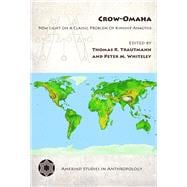
| Preface | p. vii |
| Kinship Notation | p. xi |
| Linguistic Note | p. xiii |
| A Classic Problem | p. 1 |
| Crow-Omaha in Theory | |
| Crossness and Crow-Omaha | p. 31 |
| Tetradic Theory and Omaha Systems | p. 51 |
| North America | |
| Omaha and "Omaha" | p. 69 |
| Crow-Omaha Kinship in North America: A Puebloan Perspective | p. 83 |
| Phylogenetic Analysis of Sociocultural Data: Identifying Transformation Vectors for Kinship Systems | p. 109 |
| Africa | |
| A Tetradic Starting Point for Skewing? Marriage as a Generational Contract: Reflections on Sister-Exchange in Africa | p. 135 |
| Crow- (and Omaha-) Type Kinship Terminology: The Fanti Case | p. 153 |
| Deep-Time Historical Contexts of Crow and Omaha Systems: Perspectives from Africa | p. 173 |
| South America | |
| The Making and Unmaking of "Crow-Omaha" Kinship in Central Brazilian Ethnology) | p. 205 |
| Schemas of Kinship Relations and the Construction of Social Categories among the Mebêngôkrê Kayapó | p. 223 |
| Australia | |
| Omaha Skewing in Australia: Overlays, Dynamism, and Change | p. 243 |
| "Horizontal" and "Vertical" Skewing: Similar Objectives, Two Solutions? | p. 261 |
| Afterword | |
| Crow-Omaha, in Thickness and in Thin | p. 281 |
| Notes | p. 299 |
| Glossary | p. 303 |
| References | p. 309 |
| About the Contributors | p. 335 |
| Topics Index | p. 337 |
| Peoples Index | p. 344 |
| Persons Index | p. 347 |
| Table of Contents provided by Ingram. All Rights Reserved. |
The New copy of this book will include any supplemental materials advertised. Please check the title of the book to determine if it should include any access cards, study guides, lab manuals, CDs, etc.
The Used, Rental and eBook copies of this book are not guaranteed to include any supplemental materials. Typically, only the book itself is included. This is true even if the title states it includes any access cards, study guides, lab manuals, CDs, etc.